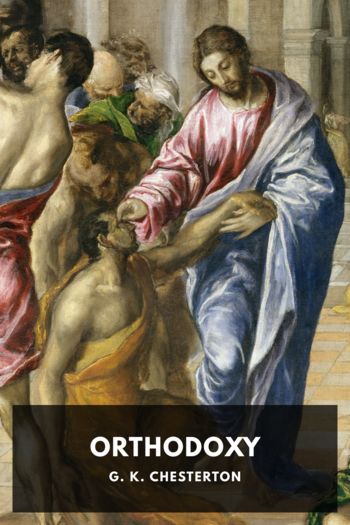Heretics, G. K. Chesterton [book series for 12 year olds txt] 📗

- Author: G. K. Chesterton
Book online «Heretics, G. K. Chesterton [book series for 12 year olds txt] 📗». Author G. K. Chesterton
Subjected to these eternal tests, America does not appear by any means as particularly fresh or untouched. She appears with all the weakness and weariness of modern England or of any other Western power. In her politics she has broken up exactly as England has broken up, into a bewildering opportunism and insincerity. In the matter of war and the national attitude towards war, her resemblance to England is even more manifest and melancholy. It may be said with rough accuracy that there are three stages in the life of a strong people. First, it is a small power, and fights small powers. Then it is a great power, and fights great powers. Then it is a great power, and fights small powers, but pretends that they are great powers, in order to rekindle the ashes of its ancient emotion and vanity. After that, the next step is to become a small power itself. England exhibited this symptom of decadence very badly in the war with the Transvaal; but America exhibited it worse in the war with Spain. There was exhibited more sharply and absurdly than anywhere else the ironic contrast between the very careless choice of a strong line and the very careful choice of a weak enemy. America added to all her other late Roman or Byzantine elements the element of the Caracallan triumph, the triumph over nobody.
But when we come to the last test of nationality, the test of art and letters, the case is almost terrible. The English colonies have produced no great artists; and that fact may prove that they are still full of silent possibilities and reserve force. But America has produced great artists. And that fact most certainly proves that she is full of a fine futility and the end of all things. Whatever the American men of genius are, they are not young gods making a young world. Is the art of Whistler a brave, barbaric art, happy and headlong? Does Mr. Henry James infect us with the spirit of a schoolboy? No; the colonies have not spoken, and they are safe. Their silence may be the silence of the unborn. But out of America has come a sweet and startling cry, as unmistakable as the cry of a dying man.
XIX Slum Novelists and the SlumsOdd ideas are entertained in our time about the real nature of the doctrine of human fraternity. The real doctrine is something which we do not, with all our modern humanitarianism, very clearly understand, much less very closely practise. There is nothing, for instance, particularly undemocratic about kicking your butler downstairs. It may be wrong, but it is not unfraternal. In a certain sense, the blow or kick may be considered as a confession of equality: you are meeting your butler body to body; you are almost according him the privilege of the duel. There is nothing undemocratic, though there may be something unreasonable, in expecting a great deal from the butler, and being filled with a kind of frenzy of surprise when he falls short of the divine stature. The thing which is really undemocratic and unfraternal is not to expect the butler to be more or less divine. The thing which is really undemocratic and unfraternal is to say, as so many modern humanitarians say, “Of course one must make allowances for those on a lower plane.” All things considered indeed, it may be said, without undue exaggeration, that the really undemocratic and unfraternal thing is the common practice of not kicking the butler downstairs.
It is only because such a vast section of the modern world is out of sympathy with the serious democratic sentiment that this statement will seem to many to be lacking in seriousness. Democracy is not philanthropy; it is not even altruism or social reform. Democracy is not founded on pity for the common man; democracy is founded on reverence for the common man, or, if you will, even on fear of him. It does not champion man because man is so miserable, but because man is so sublime. It does not object so much to the ordinary man being a slave as to his not being a king, for its dream is always the dream of the first Roman republic, a nation of kings.
Next to a genuine republic, the most democratic thing in the world is a hereditary despotism. I mean a despotism in which there is absolutely no trace whatever of any nonsense about intellect or special fitness for the post. Rational despotism—that is, selective despotism—is always a curse to mankind, because with that you have the ordinary man misunderstood and misgoverned by some prig who has no brotherly respect for him at all. But irrational despotism is always democratic, because it is the ordinary man enthroned. The worst form of slavery is that which is called Caesarism, or the choice of some bold or brilliant man as despot because he is suitable. For that means that men choose a representative, not because he represents them, but because he does not. Men trust an ordinary man like George III or William IV because they are themselves ordinary men and understand him. Men trust an ordinary man because they trust themselves. But men trust a great man because they do not trust themselves. And hence the worship of great men always appears in times of weakness and cowardice; we never hear of great men until the time





Comments (0)